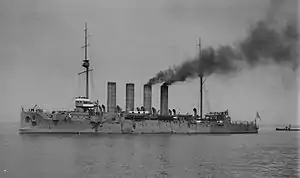Japanese cruiser Soya
Soya (宗谷) was a protected cruiser in the Imperial Japanese Navy, acquired as a prize of war during the Russo-Japanese War from the Imperial Russian Navy, where it was originally known as the Russian cruiser Varyag.
 Soya, formerly the Russian cruiser Varyag | |
| History | |
|---|---|
| Name: | Soya |
| Ordered: | 1898 |
| Builder: | William Cramp & Sons, Philadelphia |
| Laid down: | 31 October 1899 |
| Launched: | 2 January 1900 |
| Completed: | 14 January 1901 |
| Acquired: | by Japan as prize of war, 1904 |
| Commissioned: | 9 July 1907 |
| Fate: | Returned to Russia, 5 April 1916 |
| General characteristics | |
| Type: | Protected cruiser |
| Displacement: | 6,500 long tons (6,604 t) |
| Length: | 126.8 m (416 ft 0 in) w/l |
| Beam: | 15.8 m (51 ft 10 in) |
| Draught: | 6.1 m (20 ft 0 in) |
| Propulsion: | 4 reciprocating VTE engines; 2 shafts; 30 boilers; 20,000 hp (15,000 kW) |
| Speed: | 23 knots (43 km/h; 26 mph) |
| Range: | 4,500 nmi (8,300 km) at 10 knots (19 km/h; 12 mph) |
| Complement: | 571 |
| Armament: |
|
| Armour: |
|
Background
Varyag was built in the United States by William Cramp & Sons of Philadelphia for the Imperial Russian Navy. It was stationed in Korea in 1904, and involved in the opening Battle of Chemulpo Bay of the Russo-Japanese War. After suffering heavy damage from the unequal battle with nine Japanese cruisers, Varyag was scuttled by its crew on 9 February 1904.
After the Russo-Japanese War, the Japanese raised the badly damaged wreck from Chemulpo harbor, repaired it, and commissioned it into the Imperial Japanese Navy as the 2nd class cruiser Soya on 9 July 1907. Its new name was taken from the northernmost cape of Hokkaidō, Soya Misaki.
Service life
After being placed into Japanese service as a 3rd class cruiser, Soya was used primarily for training duties. From 14 March 1909 to 7 August 1909, it made a long distance navigational and officer cadet training cruise to Hawaii and North America. It repeated this training cruise every year until 1913.
During World War I Russia and Japan became allies and Soya (along with several other vessels) was transferred back to Russia at Vladivostok on 5 April 1916, and its original name of Varyag restored.
Gallery
 In 1909, at Vancouver
In 1909, at Vancouver In 1911
In 1911
References
- Evans, David. Kaigun: Strategy, Tactics, and Technology in the Imperial Japanese Navy, 1887-1941. US Naval Institute Press (1979). ISBN 0-87021-192-7
- Howarth, Stephen. The Fighting Ships of the Rising Sun: The Drama of the Imperial Japanese Navy, 1895-1945. Atheneum; (1983) ISBN 0-689-11402-8
- Jentsura, Hansgeorg. Warships of the Imperial Japanese Navy, 1869-1945. Naval Institute Press (1976). ISBN 0-87021-893-X